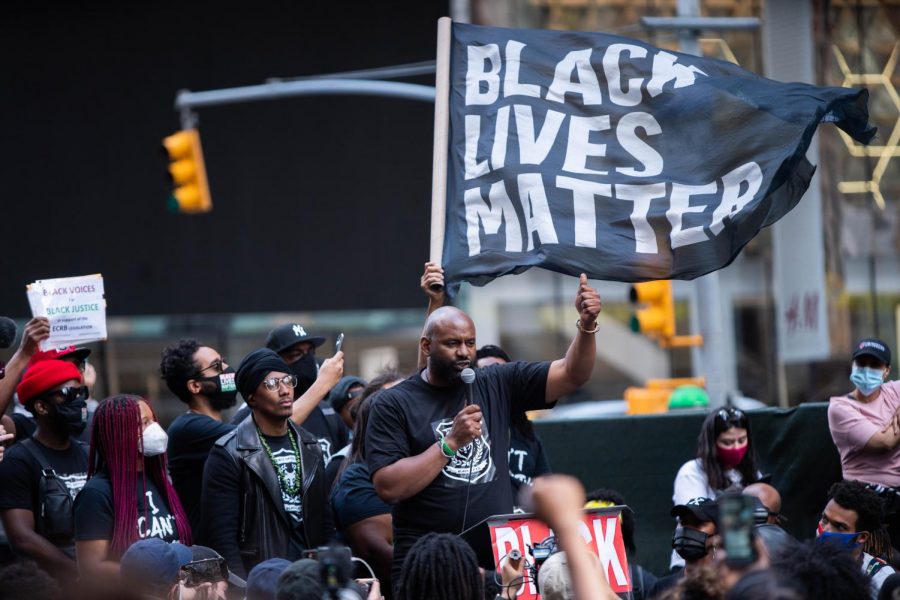Violence at Protests Exemplifies Need for Respect
It is not hard to see the irony in harm and danger finding their way to peaceful protesters marching for social justice. The Black Lives Matter protests continued on the night of Sept. 3, 2020 with an event in Times Square, where protestors gathered to mourn the death of Daniel Prude, who died after being pinned down by police officers in Rochester, New York. This peaceful gathering was abruptly interrupted when a vehicle intentionally drove through the protest. While no one reported themselves as injured by the vehicle, it is clear that safety during protests is a current national issue through the evidence shared via social media.
Given the circumstances surrounding the current issues our society faces with racial injustice and the pandemic, the Black Lives Matter organization has made it a priority to advise all who attend a protest to follow specific safety measures. These measures include wearing a face mask, carrying hand sanitizer and preparing to encounter pepper spray, mace and tear gas. There is also an encouragement for protesters to learn coronavirus symptoms and get tested immediately after protesting and being in large crowds. In addition to these precautions, local governments have also involved the police in assisting at these protests as a means also to ensure protesters’ safety.
With all that said, what more can be done to improve peaceful protesters’ safety when it seems like all that could be done is being done? It is important to recognize that the safety of these protesters is by and large jeopardized not because of their decision to protest, but because of a lack of respect from those who oppose them. What is missing is genuine respect for people, respect for what they have to say and respect for the Black Lives Matter movement. Once the human race learns the concept of mutual respect and starts to respect each other more, we will be one step closer to living in a world where justice and peace are not merely chants or cries in the streets.
The hashtag #BlackLivesMatter started trending on social media in 2013 after the deaths of Trayvon Martin, Michael Brown and Eric Garner, who were all Black men lost due to police brutality. In this year alone, the movement and hashtag have gained global awareness by demanding justice for George Floyd, Breonna Taylor, Jacob Blake, Daniel Prude and too many others.
Other examples of incidents of violence at protests have been from police officers using force without warning. One instance was from a protest in June in Seattle near the East Precinct, where officers clearly and quickly started throwing tear gas and pepper spray at the crowds. The videos show that these encounters all seem to have started over an umbrella being too close to an officer.
Ultimately, the question should not be: What can be done to improve safety during protests? The question we should be asking ourselves is: Why do peaceful protesters have to prepare for potentially violent situations? Or better yet, how do we protect peaceful protesters from violence? There are practical safety measures in place, but if this nation really has a concern for the safety of others, then America needs to start validating and protecting Black lives.
The only way to keep protestors safe is to address the problems for which they are marching. If Black lives were not threatened by a criminal justice system that was created to work against them, then protests to change that system would never have to transpire. The way to improve safety is to ensure that our legal system is one that educates people on how to effectively enforce justice, rather than perpetuate a cycle of continuous injustice and hate crimes. If our nation’s system and leaders enforced social awareness and anti-racism, we would be living in a much safer and respectful society.
Respect is found by having both understanding and compassion. It’s hard for respect to prevail in a society that, rather than listening to an opposing view, resorts to purposefully driving through a protest. Ignorance is stopping us from moving forward; it is what continues to blind us and literally drive people into violent disasters. Incomprehension and intolerance towards the movement only create more of a divide between people, and agitates the tension that already exists. We need to start doing more than just listening to each other. We must learn from each other in order to care for each other.
Not only does this matter in the name of Daniel Prude and all those who we have suffered before and after him, but it matters because all Black lives do.
Emely Mojica, FCRH ’22, is an English major and Spanish and Communications & Media minor from Harlem, N.Y.










































































































































































































